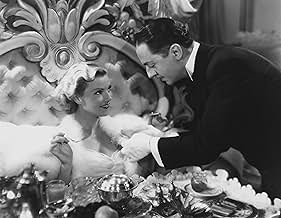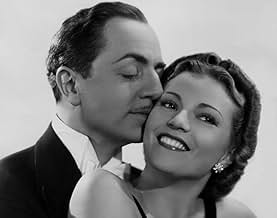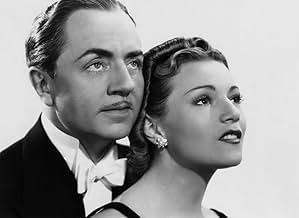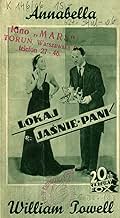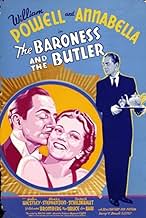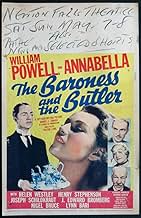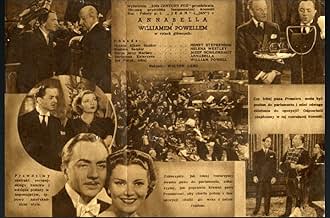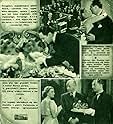अपनी भाषा में प्लॉट जोड़ेंA butler gets elected to the Hungarian parliament where he opposes his master's government.A butler gets elected to the Hungarian parliament where he opposes his master's government.A butler gets elected to the Hungarian parliament where he opposes his master's government.
- पुरस्कार
- कुल 2 जीत
Ivan F. Simpson
- Count Dormo
- (as Ivan Simpson)
Sidney Bracey
- Member of Parliament
- (as Sidney Bracy)
फ़ीचर्ड समीक्षाएं
... OR "Mr. Godfrey Goes to Budapest". So, yes, it's a pretty obvious rework of "My Man Godfrey" from 1936. But then "The Star of Midnight" and "The Ex Mrs. Bradford" were reworkings of "The Thin Man" formula and they worked.
Johan Porok (William Powell) is a third generation head butler to Count Sandor (Henry Stephenson) and his family. The count praises him for his dedication to "all of the ancient arts" of being a perfect servant. Count Sandor is prime minister of Hungary, so he is naturally interested in the outcome of the parliamentary elections. To his surprise, his butler Johan has been elected to a seat in parliament. Here is my first problem. How could Sandor's own butler be running for parliament and the prime minister not be aware?
Johan ran on the progressive ticket, and the count is a member of the conservative party, so they are at odds politically speaking. And Johan quickly rises to be a leader in his party, largely by regularly skewering his employer's performance in office. Sandor doesn't mind this, but his daughter the titular baroness (Annabella), does seem to mind a great deal. Here's some more weirdness to ponder. The baroness is married to the Baron Georg Marissey (Joseph Schildkraut), but routinely sleeps in her old room at her parents' house. She is apparently somewhat estranged from the baron although not truly separated. With Schildkraut in the part of the baron, one can only assume it is because he is some kind of slimy little weasel - Schildkraut excelled at such roles - but the source of her initial antipathy is never really revealed.
The title and having watched "My Man Godfrey" will somewhat give the outcome away, but how this happens within the bounds of the production code is something you will have to watch and find out yourself. Besides what I already mentioned, there was just something off about this production. For one thing, Annabella's accent makes her almost incomprehensible at times. I also never feel any authenticity in the Baroness' positive feelings towards Johan.
It was fun watching Powell play a politician for a change, though. He is quite the socialist in this production. He advocates redistributing farmland to the peasants - Hey Johan who exactly is going to have to "donate" this land in your scheme? - and he also advocates a reduction in armaments. If Johan recognized the winds of war that were in the air in Europe in1938, perhaps he would want to hold on to those armaments.
I'd say this film is probably a 6.5 rather than a 6 or a 7/10 if I was permitted a score with more granularity.
Johan Porok (William Powell) is a third generation head butler to Count Sandor (Henry Stephenson) and his family. The count praises him for his dedication to "all of the ancient arts" of being a perfect servant. Count Sandor is prime minister of Hungary, so he is naturally interested in the outcome of the parliamentary elections. To his surprise, his butler Johan has been elected to a seat in parliament. Here is my first problem. How could Sandor's own butler be running for parliament and the prime minister not be aware?
Johan ran on the progressive ticket, and the count is a member of the conservative party, so they are at odds politically speaking. And Johan quickly rises to be a leader in his party, largely by regularly skewering his employer's performance in office. Sandor doesn't mind this, but his daughter the titular baroness (Annabella), does seem to mind a great deal. Here's some more weirdness to ponder. The baroness is married to the Baron Georg Marissey (Joseph Schildkraut), but routinely sleeps in her old room at her parents' house. She is apparently somewhat estranged from the baron although not truly separated. With Schildkraut in the part of the baron, one can only assume it is because he is some kind of slimy little weasel - Schildkraut excelled at such roles - but the source of her initial antipathy is never really revealed.
The title and having watched "My Man Godfrey" will somewhat give the outcome away, but how this happens within the bounds of the production code is something you will have to watch and find out yourself. Besides what I already mentioned, there was just something off about this production. For one thing, Annabella's accent makes her almost incomprehensible at times. I also never feel any authenticity in the Baroness' positive feelings towards Johan.
It was fun watching Powell play a politician for a change, though. He is quite the socialist in this production. He advocates redistributing farmland to the peasants - Hey Johan who exactly is going to have to "donate" this land in your scheme? - and he also advocates a reduction in armaments. If Johan recognized the winds of war that were in the air in Europe in1938, perhaps he would want to hold on to those armaments.
I'd say this film is probably a 6.5 rather than a 6 or a 7/10 if I was permitted a score with more granularity.
An amusing little story that probably worked better on the stage and doesn't appear to have been much of a challenge for any of the cast. Powell fans will enjoy it nonetheless and Anabella is quite stunning, despite her thick accent. More of Nigel Bruce in comedy relief might have helped the film along.
Although 20th Century Fox touted this as a debut film for French star Anabella, her filmography includes two earlier American films for the same studio. A note on the Fox Movie Channel stated that production on The Baroness and the Butler was delayed while Powell mourned for Jean Harlow, who was engaged to him at the time of her death.
Although 20th Century Fox touted this as a debut film for French star Anabella, her filmography includes two earlier American films for the same studio. A note on the Fox Movie Channel stated that production on The Baroness and the Butler was delayed while Powell mourned for Jean Harlow, who was engaged to him at the time of her death.
The great William Powell is perfect as the local Jeeves for a bigwig in Hungarian politics. He was the sort of character who was admired in 1938 but was hated when Nigel Hawthorne played Malvolio in "Twelfth Night."
He's also secretly run for, and won, a seat in Parliament in the Party opposed to his master's. He retains his role as the butler, will his new position cause a rift in the family?
Playing opposite Powell was Anbabella, who did not become the new Garbo (if they needed a new Garbo her shoes would be filled by Ingrid Bergman who, unfortunately, isn't in this movie).
Powell is superb, as usual. But the story is ludicrous.
He's also secretly run for, and won, a seat in Parliament in the Party opposed to his master's. He retains his role as the butler, will his new position cause a rift in the family?
Playing opposite Powell was Anbabella, who did not become the new Garbo (if they needed a new Garbo her shoes would be filled by Ingrid Bergman who, unfortunately, isn't in this movie).
Powell is superb, as usual. But the story is ludicrous.
This is a fine film in the small category of butler and maid comedies. In most such films, a leading character assumes the identity of a butler for any number of reasons, with madcap comedy resulting. But, "The Baroness and the Butler" is different in that the butler here is a bona fide servant of the Hungarian prime minister. And, he's proud to be the head of the household staff, having followed in the footsteps of his father and ancestors before him. Small injections of satire occur here and there, especially with some subtle pokes at the aristocracy and politics of the period and place.
William Powell plays Johann Porok in the lead role. This is his second time as a butler - having played a wealthy Bostonian in disguise in "My Man Godfrey" of 1936. But, here Powell is a loyal servant who runs a perfect household for Count Albert Sandor and his family. Henry Stephenson plays the count who also happens to be the prime minister, as head of the ruling political party in Hungary.
The film has a talented cast that includes Annabella, the French star who was making her American film debut. She plays Baroness Katrina Marissey, daughter of the Count and Countess Sandor (played by Helen Westley). She is married to Baron Georg Marissey, who is played by Joseph Schildkraut. Nigel Bruce has a nice role as a pompous and bumbling Major Andros.
Porok is so well liked by the count and countess and their family, that he's almost one of the family. Well, not quite, because he's still not of their class. But they fret that Johann has no prospects of marriage, because they want his progeny to continue in the service to their family.
That's the setting when things begin to unravel as Johann wins a seat in parliament in the opposition party. He will continue to work as a devoted servant for the count, but in the parliament he is the leader of the forces that seek to wrest control of the country. Johann's speeches point to the ineptitude of the count and his party. All of this provides a fine mix of light drama and light comedy.
The best part is the relationship between Johann and the baroness. Her demeanor gradually changes from one of indignation at the thought of Johann's rise in status, to one of admiration. And, of course, love has been blooming underneath all of this. The count's role is one of an affable gentleman who admires Johann as well for his political enterprise.
The film has a nice outcome for all. It doesn't have the hilarity of the butler and maid films with mishaps and antics. But, even with a less frivolous setting and plot, this film has some very good humor and fun. It makes a nice addition to a small library of butler and maid comedy films. Here are some favorite lines.
Johann Porok, "This is the last day of parliamentary elections. Those of you who have not voted will be given time to do so today. That is all."
Klari, "Don't you ever get off your high horse and have fun?" Johann Porok, "Klari, don't let your imagination run away with you."
Count Albert Sandor, "Johann, will you kindly break my neck?" Johann Porok, "With pleasure, your excellency."
Baroness Katrina Marissey, "I'm giving a ball." Countess Sandor, "A ball? Oh, you poor child. Do we have to come?"
Baroness Katrina Marissey, "Would you like a smoke?" Johann Porok, "Thank you." Looking at the cigarette he has just taken from the box offered by the baroness, he continues, "Abdulla, with the rose leaf." Baroness, "Mother brought them back for me." Johann, "Yes, I know. I smuggled them across the border in my trunk." Baroness, "Oh."
William Powell plays Johann Porok in the lead role. This is his second time as a butler - having played a wealthy Bostonian in disguise in "My Man Godfrey" of 1936. But, here Powell is a loyal servant who runs a perfect household for Count Albert Sandor and his family. Henry Stephenson plays the count who also happens to be the prime minister, as head of the ruling political party in Hungary.
The film has a talented cast that includes Annabella, the French star who was making her American film debut. She plays Baroness Katrina Marissey, daughter of the Count and Countess Sandor (played by Helen Westley). She is married to Baron Georg Marissey, who is played by Joseph Schildkraut. Nigel Bruce has a nice role as a pompous and bumbling Major Andros.
Porok is so well liked by the count and countess and their family, that he's almost one of the family. Well, not quite, because he's still not of their class. But they fret that Johann has no prospects of marriage, because they want his progeny to continue in the service to their family.
That's the setting when things begin to unravel as Johann wins a seat in parliament in the opposition party. He will continue to work as a devoted servant for the count, but in the parliament he is the leader of the forces that seek to wrest control of the country. Johann's speeches point to the ineptitude of the count and his party. All of this provides a fine mix of light drama and light comedy.
The best part is the relationship between Johann and the baroness. Her demeanor gradually changes from one of indignation at the thought of Johann's rise in status, to one of admiration. And, of course, love has been blooming underneath all of this. The count's role is one of an affable gentleman who admires Johann as well for his political enterprise.
The film has a nice outcome for all. It doesn't have the hilarity of the butler and maid films with mishaps and antics. But, even with a less frivolous setting and plot, this film has some very good humor and fun. It makes a nice addition to a small library of butler and maid comedy films. Here are some favorite lines.
Johann Porok, "This is the last day of parliamentary elections. Those of you who have not voted will be given time to do so today. That is all."
Klari, "Don't you ever get off your high horse and have fun?" Johann Porok, "Klari, don't let your imagination run away with you."
Count Albert Sandor, "Johann, will you kindly break my neck?" Johann Porok, "With pleasure, your excellency."
Baroness Katrina Marissey, "I'm giving a ball." Countess Sandor, "A ball? Oh, you poor child. Do we have to come?"
Baroness Katrina Marissey, "Would you like a smoke?" Johann Porok, "Thank you." Looking at the cigarette he has just taken from the box offered by the baroness, he continues, "Abdulla, with the rose leaf." Baroness, "Mother brought them back for me." Johann, "Yes, I know. I smuggled them across the border in my trunk." Baroness, "Oh."
To introduce French film star Annabella to American audiences, 20th Century Fox got a European type product as a fitting vehicle for her. And to play the butler who goes to Parliament, Darryl Zanuck obtained the services of William Powell from MGM.
Like that other favorite butler role that Powell essayed in My Man Godfrey, Powell is a butler with a social conscience, a fact he keeps hidden from his employers Henry Stephenson, Helen Westley and their daughter Annabella. How he kept secret the fact that his left wing party has nominated him for a seat in the Hungarian Parliament is beyond me. Nevertheless on election eve the family learns that Stephenson will be returned as Prime Minister and Powell will be occupying a seat on the back bench.
The Baroness And The Butler is the kind of film that would have been made in any number of European countries, a delightful bit of Frou-Frou that definitely did not have any relation to Hungary in 1938 with Admiral Miklos Horthy running things as a fascist learning military dictator. Those parliamentary elections have about as much relevance as those that were still going on in Nazi Germany where Reichstag elections were dutifully held with only one party being allowed to participate.
Still Powell and Annabella are nothing less than charming and capable players and they pull this film through and you can actually enjoy it if you'll completely suspend disbelief. Of course Powell and Annabella are in love, but she's unhappily married to a philandering Joseph Schildkraut. And Schildkraut like Captain O'Shea in Ireland is going to make the scandal make his career. As usual Schildkraut is letter perfect playing the part of an unscrupulous schemer, characteristics he patented at the height of his career.
If you're a fan of the stars you'll enjoy The Baroness And The Butler.
Like that other favorite butler role that Powell essayed in My Man Godfrey, Powell is a butler with a social conscience, a fact he keeps hidden from his employers Henry Stephenson, Helen Westley and their daughter Annabella. How he kept secret the fact that his left wing party has nominated him for a seat in the Hungarian Parliament is beyond me. Nevertheless on election eve the family learns that Stephenson will be returned as Prime Minister and Powell will be occupying a seat on the back bench.
The Baroness And The Butler is the kind of film that would have been made in any number of European countries, a delightful bit of Frou-Frou that definitely did not have any relation to Hungary in 1938 with Admiral Miklos Horthy running things as a fascist learning military dictator. Those parliamentary elections have about as much relevance as those that were still going on in Nazi Germany where Reichstag elections were dutifully held with only one party being allowed to participate.
Still Powell and Annabella are nothing less than charming and capable players and they pull this film through and you can actually enjoy it if you'll completely suspend disbelief. Of course Powell and Annabella are in love, but she's unhappily married to a philandering Joseph Schildkraut. And Schildkraut like Captain O'Shea in Ireland is going to make the scandal make his career. As usual Schildkraut is letter perfect playing the part of an unscrupulous schemer, characteristics he patented at the height of his career.
If you're a fan of the stars you'll enjoy The Baroness And The Butler.
क्या आपको पता है
- ट्रिवियाThe film was rejected by the censors in Quebec, Canada while the Romanian censors removed all references to Hungary.
- गूफ़Early in the film, Powell's character can be seen using a tea trolley with a large map of and coat of arms prominently displayed on its back. Both represent Australia, not Hungary, where the film is set.
- भाव
Johann Porok: My congratulations sir.
Count Albert Sandor: For what?
Johann Porok: Your triumph.
Count Albert Sandor: Oh - that. You'd think at my age I'd have sense enough to get out of politics instead of wasting all my time with a lot of nincompoops and parasites.
- कनेक्शनReferenced in Hollywood Hist-o-Rama: William Powell (1961)
- साउंडट्रैकTales From the Vienna Woods Op. 325
(1868) (uncredited)
Written by Johann Strauss
In the score for the opening scenes
टॉप पसंद
रेटिंग देने के लिए साइन-इन करें और वैयक्तिकृत सुझावों के लिए वॉचलिस्ट करें
- How long is The Baroness and the Butler?Alexa द्वारा संचालित
विवरण
- रिलीज़ की तारीख़
- कंट्री ऑफ़ ओरिजिन
- भाषा
- इस रूप में भी जाना जाता है
- Baronica in njen sluga
- फ़िल्माने की जगहें
- बुडापेस्ट, हंगरी(Stock Footage)
- उत्पादन कंपनी
- IMDbPro पर और कंपनी क्रेडिट देखें
- चलने की अवधि1 घंटा 20 मिनट
- रंग
- पक्ष अनुपात
- 1.37 : 1
इस पेज में योगदान दें
किसी बदलाव का सुझाव दें या अनुपलब्ध कॉन्टेंट जोड़ें

टॉप गैप
By what name was The Baroness and the Butler (1938) officially released in Canada in English?
जवाब
